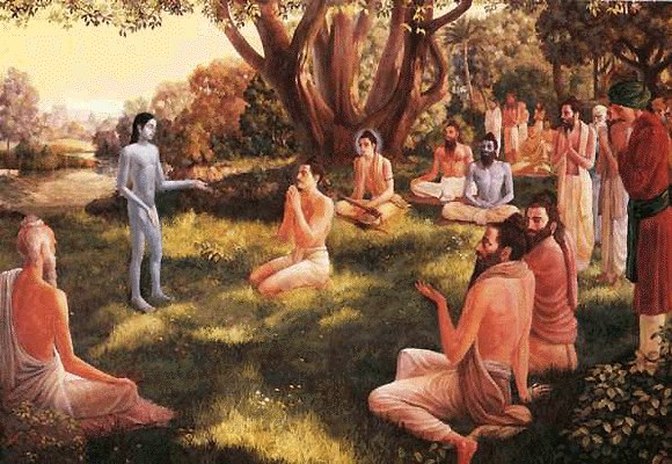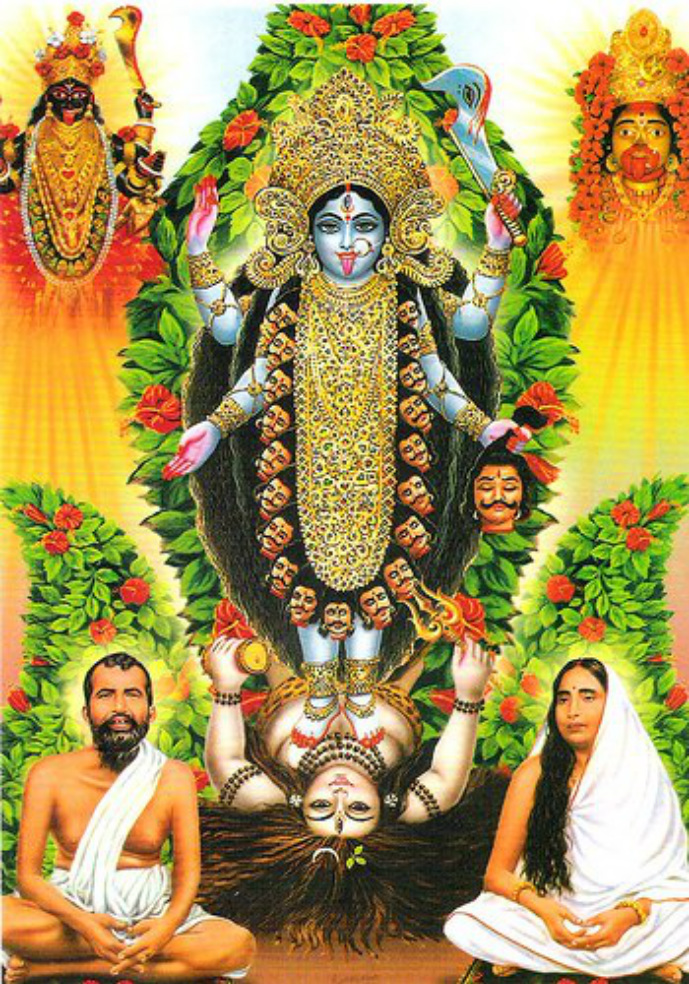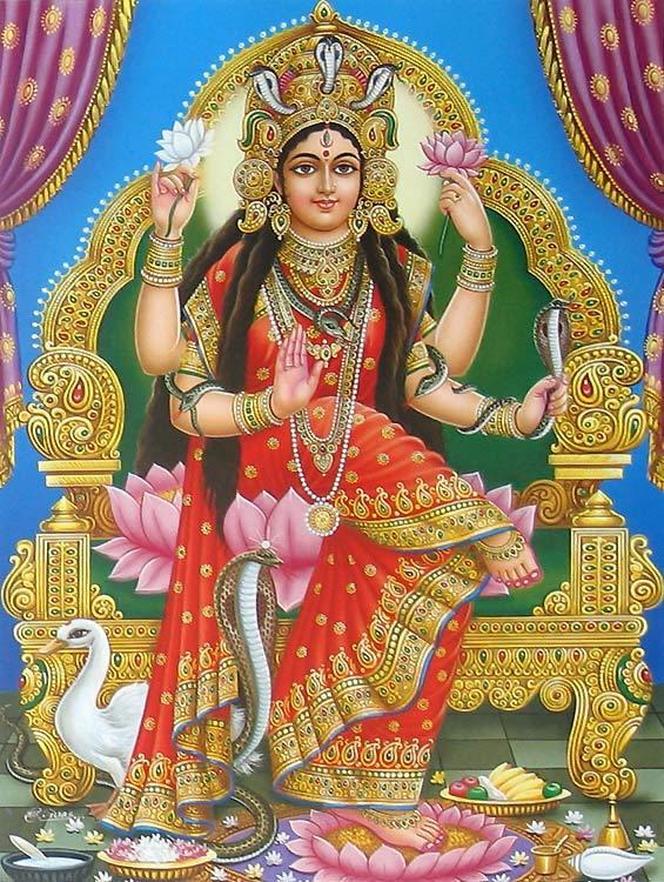
In Shrimad-Bhagavatam there are many narrations about great kings. The purpose of these stories is not simply to relate the kings’ heroic activities, however. This is an attractive feature of such narrations, but Shukadeva Gosvami’s real purpose is to teach transcendental knowledge and renunciation.
Maharaja Parikshit said, “O great sage, how can persons living in Kali-yuga free themselves from the terrible contamination of this age? Please explain to me the special qualities of all the yugas.”
Shukadeva Gosvami said, “My dear King, in the beginning, during Satya-yuga, religion is present with all four of its legs- truthfulness, mercy, austerity and charity (or cleanliness). The people of Satya-yuga are generally self-satisfied, merciful, friendly to all, peaceful, sober, and tolerant. They take pleasure from within, and endeavor diligently for spiritual perfection.”
“In Treta-yuga, each leg of religion is gradually reduced by one fourth, due to the influence of the four pillars of irreligion- lying, violence, dissatisfaction, and quarrel. In this age, society evolves into four separate classes, but most of the people are brahmanas. People are not very prone to violence, nor are they very lusty for sensual enjoyment.”
“In Dvapara-yuga, the four legs of religion are reduced to one-half. Of the four classes, the kshatriyas and brahmanas are most numerous. People are very noble-minded and they are eager to achieve renown. They devote themselves to study of the Vedas, they support large families in great opulence, and they enjoy life with vigor.”
“In the beginning of Kali-yuga, only one-fourth of religious principles remains, and that also gradually dwindles to nil. People tend to be very greedy, ill behaved, and merciless, and they fight among themselves for no good reason. Almost all are shudras and barbarians.”
“The three modes of material nature are present everywhere, and how they proportionately exert their influence is observed within a person’s mind. The four yugas are also manifestations of the three gunas. In each yuga, there can be manifestations of the other ages, according to the particular mode that predominates. For example, by cultivation of the mode of goodness, there may be a temporary manifestation of Satya-yuga within the age of Kali.”
“When the mind, intelligence and senses are all firmly fixed in goodness, that time should be understood as Satya-yuga. When people are devoted to their duties, but for some ulterior purpose, such as personal prestige- the mode of passion is prominent. Such a time should be understood as Treta-yuga. When greed, dissatisfaction, false pride, hypocrisy and envy become prominent, due to a predominance of mixed passion and ignorance- such a time should be understood as Dvapara-yuga. When there is a predominance of cheating, lying, laziness, violence, depression, lamentation, bewilderment, fear and poverty- that is Kali-yuga, the age of ignorance.”
“Due to the influence of Kali-yuga, people will become shortsighted, gluttonous, lusty and poverty-stricken. Women will become unchaste and will wander from one man to the next. Cities will become dominated by criminals, the Vedas will become distorted by the commentaries of atheists, politicians will practically devour the citizens, and so-called priests and intellectuals will actually be devotees of their bellies and genitals.”
“Brahmacharis will no longer fulfill their vows, and they will become generally unclean. Householders will no longer be charitable, but instead will become like beggars. Vanaprasthas will remain in their villages, and sannyasis will be greedy to amass wealth.”
“Women will become much shorter, eat too much and become fat, have more children than they can take care of, and lose all shyness. Their speech will be harsh and their actions will be full of deceit. Businessmen will earn money by cheating, and people will not hesitate to accept any kind of degraded or horrible occupation.”
“Servants will abandon a master who has lost his wealth, even though he may be of exemplary character. Masters will abandon an incapacitated servant, even if he has been with the family for a long time. Cows will be either abandoned or killed as soon as they stop giving milk. Men will become controlled by women, and as a result, they will become effeminate and neglect their families.”
“Uncultured men will earn their livelihood by making a show of austerity and wearing a mendicant’s dress. Although knowing nothing about real religion, they will mount a high seat and pretend to speak about spirituality.”
“In Kali-yuga, peoples’ minds will always be disturbed. Masses of people will become emaciated due to famine caused by drought. Harassed also by excessive taxation, many people will not even have an adequate place to engage in sex. And, having no ornaments to decorate themselves with, the people will gradually come to resemble ghostly, haunted creatures.”
“In Kali-yuga, enmity will break out over just a few coins. Because of such quarrels, people will be ready to lose their own lives or kill their own relatives. Men will no longer properly maintain their elderly parents, respectable wives or children. Becoming so thoroughly degraded, their only concern will be to satisfy their bellies and genitals.”
“Atheism will prevail over people’s intelligence and, as a result, very little sacrifice will be offered to the Supreme Lord. Although the great controllers of the universe bow down at the lotus feet of the Supreme Lord, such petty and miserable human beings of this age will not do so. Terrified, and about to die, a man collapses on his bed. Although his voice is faltering and he hardly knows what he is saying, if he chants the holy name of the Supreme Lord, he can be freed from all sinful reactions and go to the spiritual world. Still, the people of Kali-yuga will not worship God. If a person hears about, glorifies or remembers the Supreme Lord, from within his heart, the Lord will remove the contamination that has accumulated for many thousands of lifetimes.”
“Therefore, O King, try as hard as possible to concentrate upon the Lord in your heart. By maintaining this concentration you will certainly attain the supreme destination at the time of death. When meditated upon by those who are about to die, the Personality of Godhead reveals to them their eternal spiritual identity. Although this Kali-yuga is an ocean of faults, there is one glorious quality. Simply by chanting the name, Krishna, one can get freed from material bondage and go back home, back to Godhead. Whatever was obtained in Satya-yuga by meditation, in Treta-yuga by performing sacrifice, and in Dvapara-yuga by serving the Lord’s lotus feet- can be obtained in Kali-yuga, simply by chanting the holy name of the Lord.”
Hinduism forgotten facts ...
Maharaja Parikshit said, “O great sage, how can persons living in Kali-yuga free themselves from the terrible contamination of this age? Please explain to me the special qualities of all the yugas.”
Shukadeva Gosvami said, “My dear King, in the beginning, during Satya-yuga, religion is present with all four of its legs- truthfulness, mercy, austerity and charity (or cleanliness). The people of Satya-yuga are generally self-satisfied, merciful, friendly to all, peaceful, sober, and tolerant. They take pleasure from within, and endeavor diligently for spiritual perfection.”
“In Treta-yuga, each leg of religion is gradually reduced by one fourth, due to the influence of the four pillars of irreligion- lying, violence, dissatisfaction, and quarrel. In this age, society evolves into four separate classes, but most of the people are brahmanas. People are not very prone to violence, nor are they very lusty for sensual enjoyment.”
“In Dvapara-yuga, the four legs of religion are reduced to one-half. Of the four classes, the kshatriyas and brahmanas are most numerous. People are very noble-minded and they are eager to achieve renown. They devote themselves to study of the Vedas, they support large families in great opulence, and they enjoy life with vigor.”
“In the beginning of Kali-yuga, only one-fourth of religious principles remains, and that also gradually dwindles to nil. People tend to be very greedy, ill behaved, and merciless, and they fight among themselves for no good reason. Almost all are shudras and barbarians.”
“The three modes of material nature are present everywhere, and how they proportionately exert their influence is observed within a person’s mind. The four yugas are also manifestations of the three gunas. In each yuga, there can be manifestations of the other ages, according to the particular mode that predominates. For example, by cultivation of the mode of goodness, there may be a temporary manifestation of Satya-yuga within the age of Kali.”
“When the mind, intelligence and senses are all firmly fixed in goodness, that time should be understood as Satya-yuga. When people are devoted to their duties, but for some ulterior purpose, such as personal prestige- the mode of passion is prominent. Such a time should be understood as Treta-yuga. When greed, dissatisfaction, false pride, hypocrisy and envy become prominent, due to a predominance of mixed passion and ignorance- such a time should be understood as Dvapara-yuga. When there is a predominance of cheating, lying, laziness, violence, depression, lamentation, bewilderment, fear and poverty- that is Kali-yuga, the age of ignorance.”
“Due to the influence of Kali-yuga, people will become shortsighted, gluttonous, lusty and poverty-stricken. Women will become unchaste and will wander from one man to the next. Cities will become dominated by criminals, the Vedas will become distorted by the commentaries of atheists, politicians will practically devour the citizens, and so-called priests and intellectuals will actually be devotees of their bellies and genitals.”
“Brahmacharis will no longer fulfill their vows, and they will become generally unclean. Householders will no longer be charitable, but instead will become like beggars. Vanaprasthas will remain in their villages, and sannyasis will be greedy to amass wealth.”
“Women will become much shorter, eat too much and become fat, have more children than they can take care of, and lose all shyness. Their speech will be harsh and their actions will be full of deceit. Businessmen will earn money by cheating, and people will not hesitate to accept any kind of degraded or horrible occupation.”
“Servants will abandon a master who has lost his wealth, even though he may be of exemplary character. Masters will abandon an incapacitated servant, even if he has been with the family for a long time. Cows will be either abandoned or killed as soon as they stop giving milk. Men will become controlled by women, and as a result, they will become effeminate and neglect their families.”
“Uncultured men will earn their livelihood by making a show of austerity and wearing a mendicant’s dress. Although knowing nothing about real religion, they will mount a high seat and pretend to speak about spirituality.”
“In Kali-yuga, peoples’ minds will always be disturbed. Masses of people will become emaciated due to famine caused by drought. Harassed also by excessive taxation, many people will not even have an adequate place to engage in sex. And, having no ornaments to decorate themselves with, the people will gradually come to resemble ghostly, haunted creatures.”
“In Kali-yuga, enmity will break out over just a few coins. Because of such quarrels, people will be ready to lose their own lives or kill their own relatives. Men will no longer properly maintain their elderly parents, respectable wives or children. Becoming so thoroughly degraded, their only concern will be to satisfy their bellies and genitals.”
“Atheism will prevail over people’s intelligence and, as a result, very little sacrifice will be offered to the Supreme Lord. Although the great controllers of the universe bow down at the lotus feet of the Supreme Lord, such petty and miserable human beings of this age will not do so. Terrified, and about to die, a man collapses on his bed. Although his voice is faltering and he hardly knows what he is saying, if he chants the holy name of the Supreme Lord, he can be freed from all sinful reactions and go to the spiritual world. Still, the people of Kali-yuga will not worship God. If a person hears about, glorifies or remembers the Supreme Lord, from within his heart, the Lord will remove the contamination that has accumulated for many thousands of lifetimes.”
“Therefore, O King, try as hard as possible to concentrate upon the Lord in your heart. By maintaining this concentration you will certainly attain the supreme destination at the time of death. When meditated upon by those who are about to die, the Personality of Godhead reveals to them their eternal spiritual identity. Although this Kali-yuga is an ocean of faults, there is one glorious quality. Simply by chanting the name, Krishna, one can get freed from material bondage and go back home, back to Godhead. Whatever was obtained in Satya-yuga by meditation, in Treta-yuga by performing sacrifice, and in Dvapara-yuga by serving the Lord’s lotus feet- can be obtained in Kali-yuga, simply by chanting the holy name of the Lord.”
Hinduism forgotten facts ...


 RSS Feed
RSS Feed

